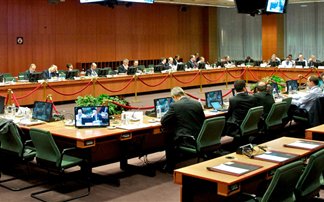By Leslie Shaffer, CNBC
Greece was unable to reach a deal with the European Union to stay in an EU bailout program on Wednesday, Eurogroup President Jeroen Dijsselbloem said, noting talks will continue on Monday.
“We discussed the possibility of an extension. For some that is clear that is preferred option but we haven’t come to that conclusion as yet. We will need a little more time,” he told reporters in Brussels.
Greek Finance Minister Yanis Varoufakis, who was expected to announce an overhaul of the country’s current bailout program, played down the outcome. Talks were “very good”, he told reporters, adding that a “healing deal” on Greece’s finances could be reached on Monday, according to Reuters.
Varoufakis was expected to propose new reforms—to make up for the ones that the new Greek government wants to scrap—and to ask for a “bridge program” to cover the government’s funding needs until a new debt pact is reached.
Since Syriza, a left-wing party, took control of the government last month, Greece has battled to dismantle the austerity measures and structural reforms on which its 240 billion euro ($272 billion) international bailout is conditional. Greece is at loggerheads with European politicians such as German Finance Minister Wolfgang Schaeuble, who say that Greece must stick to the previously agreed terms.
No surprises
“At some point, people realized it was Groundhog Day all over again,” said Tony Nash, global vice president at Delta Economics.
A draft statement of the rejected deal had planned to extend the current program as a bridge to a new package, according to a Reuters report.
Nash believes there’s still hope for a temporary deal. “But increasingly, there’s a realization that something more permanent has to come into place,” he said. “You can’t keep people under austerity for years and years with no ability for them to come out of it.”
The clock is ticking on the talks. The current instalment of Greece’s bailout is set to end on February 28 and further international loans are unlikely unless Greece can quickly strike an agreement with its bailout supervisors—the European Central Bank (ECB), the European Commission and the International Monetary Fund (IMF).
“What the new government in Greece has done has put a sense of urgency around these discussions,” Nash said. “Greece is realizing it has more power,” considering the risks to the rest of the euro zone if the country were to exit the monetary union.
Grexit a possibility
While a so-called Grexit, or Greek exit from the common currency, was once considered an outlier scenario, it’s being increasingly bandied about.
Indeed, Alan Greenspan, who headed up the U.S. Federal Reserve for 19 years before retiring 2006, told BBC Sunday that, “I believe [Greece] will eventually leave. I don’t think it helps them or the rest of the euro zone.”
While Nash believes Greece would likely be better off staying within the euro zone, he also noted that “negotiators must [either] continue to come up with packages or let Greece re-drachmatize.”
Some believe that if a deal isn’t reached, Grexit will become a fait accompli.
If there’s no compromise, Greece will default on its IMF and ECB loans, it would face further deposit outflows and the ECB will cut the Greek banking system off from liquidity support, Societe Generale said in a note Wednesday, after the talks broke down.
That would mean “Greece is de facto no longer part of the monetary union,” Societe Generale said. “It could still use the euro (like Montenegro) but it would have to issue a parallel currency (IOU) to meet its domestic obligations (civil servant wages, pensions…). That would be Grexit.”
That wouldn’t be a quick process though. Greece would likely need to hold fresh elections as the government won a mandate to end austerity, not to exit the euro zone, Societe Generale noted.
Don’t look back
Some do see some benefits from Greece leaving the euro behind.
“A weaker currency would help to use up the vast amounts of spare capacity in the economy more quickly and hence reduce the threat of a very deep and prolonged bout of deflation,” Jonathan Loynes, chief European economist at Capital Economics, said in a note Wednesday, before the talks appeared to have broken down. He noted that Greece’s economy, while once again expanding, is still around 25 percent smaller than it was before the recession, suggesting a lot of spare capacity.
“With continued euro membership implying years of further painful internal devaluation, the alternative of a much weaker new drachma has some clear attractions,” Loynes said.
Despite the talks’ breakdown, the markets didn’t appear overly worried about a Grexit just yet.
The euro was modestly lower against the U.S. dollar at 1.1308 in early Asian trading on Thursday.
“While [the euro] was not devastated, disappointment at the conspicuous absence of a workable deal between Greece and EU (in the current form) was hard to hide,” Mizuho Bank said in a note. “Talks will now stretch into the meeting on Monday; nerves will be stretched too.”
Editor’s Note: Prior to the press conference, a source familiar with the matter told CNBC that the negotiators had reached an “agreement in principle,” with details still to be hammered out. Luxembourg’s Finance Minister Pierre Gramegna also at one point confirmed negotiators had agreed on a plan, according to media reports.
But efforts to reach a joint statement failed after Greece’s Varoufakis consulted with government colleagues late in the process.









